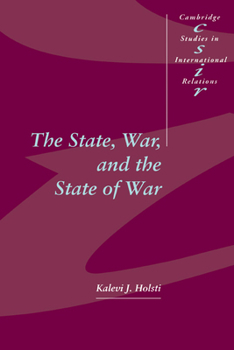The State, War, and the State of War
Select Format
Select Condition 
Book Overview
War has traditionally been studied as a problem deriving from the relations between states. Strategic doctrines, arms control agreements, and the foundation of international organizations such as the United Nations are designed to prevent wars between states. Since 1945, however, the incidence of interstate war has actually been declining rapidly, while the incidence of internal wars has been increasing. The author argues that in order to understand this significant change in historical patterns, we should jettison many of the analytical devices derived from international relations studies and shift attention to the problems of 'weak' states, those states unable to sustain domestic legitimacy and peace. This book surveys some of the foundations of state legitimacy and demonstrates why many weak states will be the locales of war in the future. Finally, the author asks what the United Nations can do about the problems of weak and failed states.
Format:Paperback
Language:English
ISBN:052157790X
ISBN13:9780521577908
Release Date:August 1996
Publisher:Cambridge University Press
Length:272 Pages
Weight:0.94 lbs.
Dimensions:0.7" x 6.1" x 9.1"
Customer Reviews
1 rating
Holsti is God!
Published by Thriftbooks.com User , 27 years ago
As a student of Professor Holsti at the Univ. of BC, I could not help but to be impressed with this book. He gives an indepth historical survey of Mankind's war, then focuses on what he dubs as the "wars of the third kind" or low-intensity conflict. He documents case studies on each wars of the third kind, then focuses on what can be done to resolve this new type of conflict. Two thumbs up, Professor Holsti! Jeong Lee





